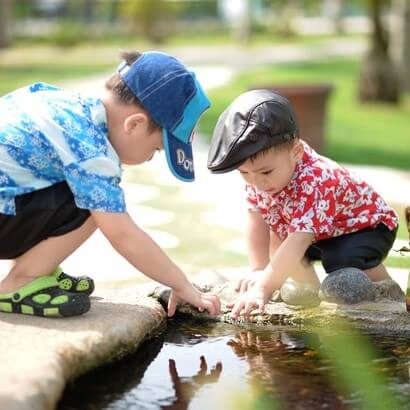Parental attitude has been shown to mould safe sun practices amongst children.
My experience growing up mirrors this. My mother had a bottomless tube of grainy, opaque white sunscreen that she stored in the scorching heat of our car’s glove compartment. On occasion, she may have applied it. Growing up, as a dusky complexioned person living close to the equator, I NEVER used sunscreen.
By comparison, my South Korean friend, spent his childhood completely slathered in sunscreen and a hat. His mother’s handbag always had emergency sweets, a lipstick and sunscreen.
No prizes for guessing whether he has issues with sun damage or I. (Its me by the way).
Do children need sun protection and if so, why?
Yes….I found this statement by the European Union regulators, which explains both the importance of sun protection for kids (and gratutiously puts the fear of God in you):
…it is commonly recognised that 80% of skin cancers are due to sun exposure under the age of 18 (American Academy of Dermatology). Thus there is a strong benefit in protecting children against UV-light exposure, amongst other measures by sun protection products, UV photons being amongst the most toxic, carcinogenic, mutagenic and immunosupressive agents in daily life.
https://ec.europa.eu/health/archive/ph_risk/committees/sccp/documents/out152_en.pdf
Countries such as Australia have very intense UV Radiation (UVR) and correspondingly high rates of skin cancer. Ensuring children are adequately protected from UVR is a serious public health issue, as it translates in reduced risk of skin cancer (and lower medical costs).
From what age should I apply sun protection to my child?
For anyone below the age of 6 months (newborns, infants, kids or whatever you call them) the consensus is NO SUNSCREEN should be applied.
Why? (If you are a parent, then you implicitly already know this)… Kids have THINNER, SENSITIVE and MORE ABSORPTIVE skin than adults as well as LARGER SURFACE AREA to weight than adults. This means kids absorb more chemicals.
Some sunscreens are labelled as being suitable for use on children that are six months and over. I think that’s a personal call and honestly, I am in 1 year+ upwards camp
What should I be looking for in sunscreen ?
- When you can, choose water resistant formulations, as kids sweat
- Choose UV filters that have a long-track record of safe usage for human skin. Only two such filters exist:
- ZINC OXIDE
- TITANIUM DIOXIDE
- Don’t use formulations that contain harmful chemicals such as:
- Parabens (See Chemicals to Avoid: Parabens)
- Oxybenzone / Benzophenone-3 (See Chemicals to Avoid: Benzophenone-3)
- BHT and BHA
- Fragrance – this is a major skin irritant
- For parent’s concerned about completely clean products, you can also look for David Suzuki’s “dirty dozen,” which include the following chemicals. You want to avoid these in sunscreen formulations. (Follow the hyperlink on each chemical for further information).
- Coal tar dyes: p-phenylenediamine and colours listed as “CI” followed by a five digit number
- DEA-related ingredients
- Dibutyl phthalate
- Formaldehyde-releasing preservatives
- PEG compounds
- Petrolatum
- Siloxanes
- Sodium laureth sulfate
- Triclosan
If you don’t live in Australia and you have dark skin (as many South Asians do), does your similar complexioned child need to be slathered with sun protection?
I’d encourage you to read “Myths About Sun Protection” which specifically addresses the need for darker complexioned individuals to use sun protection. In a nutshell, there is no such thing as totally UV-resistant human skin. Even the darkest skin type incur significant DNA damage when exposed to UVR.
For kids, the honest truth is NO ONE has done sufficient studies on the impact on skin health of applying sunscreen to darker skinned kids. Admittedly, darker complexion children are less likely to get skin cancer, but we do know UVA damage is cumulative.
Cumulative UVA damage causes photo-aging, immunosuppression and DNA damage… So, yes, kids irrespective of their complexion should be using sun screen.
Is sunscreen the best form of sun protection for my kid?
This is a skincare blog and I am sure you are expecting to read that all kids should be slathered in sunscreen 24/7, 365 days a year. This is not my position.
An inevitable part of growing up is (thankfully) playing outside with your friends – whatever the weather. Kids SWEAT and yes, you can slap on water resistant sunscreen, BUT its going to come off.
Plus let’s be crystal clear, irrespective of the type of sunscreen you use, you are applying a bunch of chemicals to their body.
Sunscreen should always be seen as supplementing sun protection for children. Protective clothing (especially swimwear), hats, not being outside during peak UVR hours are more effective for kids, as sunscreen will come off.
I would love to hear about the type of sunscreen you use on your kids!
Photo credit: Photo by Ashley K Little from Pexels
